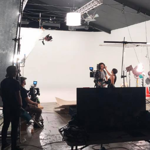We recently conducted a series of interviews to cover some of the production professionals being highlighted and represented at this year's Tribeca Film Festival, which is running from June 8 - 19th.
In this interview, we spoke with Editor Bryan Mason about his work on Good Luck to You, Leo Grande.
Synopsis: In “Good Luck To You, Leo Grande,” two-time Academy Award® winner Emma Thompson embodies the candor and apprehension of retired teacher Nancy Stokes, and newcomer Daryl McCormack personifies the charisma and compassion of sex worker Leo Grande. As Nancy embarks on a post-marital sexual awakening and Leo draws on his skills and charm, together they find a surprising human connection.
PH: How did you get your start in the film industry and what was your first project?
Bryan Mason: I started in this industry by making skateboarding videos with my friends as a teenager, from there I studied film and started working professionally in commercials and documentary. The first project which felt like mine was the first proper skateboarding film which i made whilst studying, it was called Nearly and I made it in 1995. I did everything on this production - conceived, shot, edited, marketed and released. It was a great amount of fun and a massive learning curve.
PH: What project did you work on at Tribeca and how did you become involved?
Bryan Mason: I worked on two projects which are screening at this year’s Tribeca, I edited a doc called The Dreamlife of Georgie Stone and shot and edited a feature called Good Luck to You, Leo Grande. Dreamlife is directed by Maya Newell, who I worked with on her last film (In My Blood It Runs). So, when she moved onto making Dreamlife she asked me back, which was nice. It was an interesting prospect as it takes an elliptical journey through memory and time, which was a fun prospect in terms of the edit. Leo, on the other hand, was a film we shot in the UK early 2021 in the midst of the lockdowns over there. The director Sophie Hyde and I have a long term collaboration, this is our 3rd feature drama film together.

PH: Why did you choose to edit on Premiere Pro and how did it help you achieve the creative vision?
Bryan Mason: I have been cutting on Premiere Pro for the last 8 years now. I find it to be a great platform, so customisable and intuitive. Really what I want in a nonlinear edit system, Premiere provides - fast workflows, a robust platform and the ability to set up both the interface and keyboard to facilitate whichever way of working makes the most sense to you.
PH: What was your favorite scene to cut together and why?
Bryan Mason: There is a dance scene in the middle of the film and this was the most enjoyable to both shoot and edit. It is one of the first moments the character of Nancy (played by Emma Thompson) starts to relax and her brittle exterior starts to crack. It really was a scene filled with joy on many levels.
PH: How did you collaborate with others involved in the post-production process (assistant editor, directors, producers, etc)?
Bryan Mason: While we were shooting the film in the UK, our trusted assembly editor, Cleland Jones, was busy back in Australia editing together each day’s scenes. The way the time difference works, we would upload the rushes at the end of the shooting day and by the time we would get back to set the next morning there would often be assemblies to look at or at least a coverage report, which was super useful. Sophie Hyde (director) and I work very closely throughout the edit, looking for the best path through the material, looking for the best performances possible for each beat. The film is ostensibly a two-hander set in one room so the rhythm of the performance and the rhythm of the edit felt even more important to get right.
PH: What is one thing you wish you would have known first starting out in the film industry?
Bryan Mason: Don't worry, it's always hard. Each project is hard and will have its challenges. I think I naively thought that as you get better at your job and as the budget or time increased that the work would get easier. However, if you want each film to be as good as you can get it in the time you have, then there is a necessary challenge and delve, which will happen, and it is likely to be hard.
PH: What is the best piece of advice you’ve ever received?
Bryan Mason: The cavalry isn't coming.












Comments
There are no comments on this blog post.